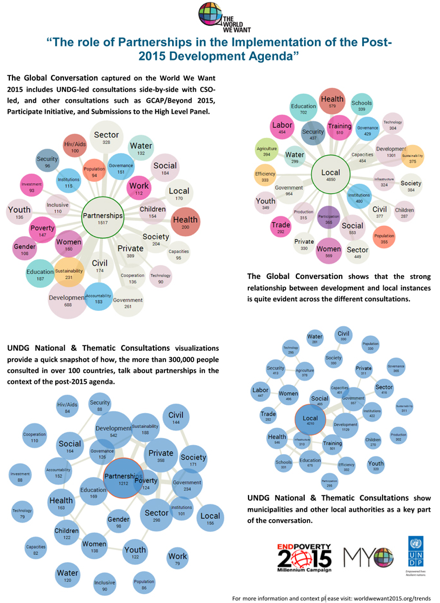The UN General Assembly (UNGA) and the Economic and Social Council (ECOSOC) held a joint thematic debate on the role of partnerships in implementing the post-2015 development agenda.
 10 April 2014: The UN General Assembly (UNGA) and the Economic and Social Council (ECOSOC) held a joint thematic debate on the role of partnerships in implementing the post-2015 development agenda.
10 April 2014: The UN General Assembly (UNGA) and the Economic and Social Council (ECOSOC) held a joint thematic debate on the role of partnerships in implementing the post-2015 development agenda.
Opening the event, held on 9-10 April 2014, at UN Headquarters in New York, US, UNGA President John Ashe said a strengthened global partnership should be based on “mutual respect and trust, the fulfilment of previously agreed commitments and a renewed accountability framework, including means of implementation.” He added that while international partnerships are important, national and regional level partnerships can add great value, and called for building new capacity in that regard
In his opening comments, ECOSOC President Martin Sajdik he said the joint marked the first time ECOSOC and all 193 UN Member States will work together to find action-oriented solutions for moving the development agenda forward. While “we are all quite aware of the importance of multi-stakeholder collaboration,” discussion is needed on how to maximize their potential. He said ECOSOC will play a major role, though its AMR, in preparing and implementing the post-2015 development agenda, and he looked forward to its bolstered role as effective monitoring platform. Finally, he said the post-2015 framework and related partnerships should ensure a rights-based approach, and account for the needs of vulnerable countries.
UN Secretary-General Ban Ki-moon said the means of implementation for the post-2015 development framework must be as ambitious as the goals. On the role of the private sector, he called for scaling up the UN Global Compact. He also highlighted his proposal for a Partnership Facility, which is under consideration by Member States, noting that it aims to equip the UN with the capacity needed to harness the strengths of external partners, as well as to ensure a coherent and accountable approach. He called on participants to “develop our own means of implementation so that we can rise to a level of effectiveness that is commensurate with our ambitions.”
The event’s keynote speaker was Tony Elumelu, Chairman, Heirs Holdings, and Founder, Tony Elumelu Foundation. He emphasized three issues affecting Africa in the implementation of the post-2015 development agenda: tackling unemployment and stimulating job creation; increasing access to electricity; and engaging civil society as key stakeholders in achieving the post-2015 development goals. He suggested that the new agenda’s achievements will be limited with a heavy focus on governments and without increasing engagement with the private sector. He said the private sector can never displace government financing, but rather the latter incentivizes private sector contributions. Further, it is “not safe to assume” that all business are driven by financial gain. He called for “CSR 2.0” to promote business’ creation of value in societies in which they source and operate.
Civil Society Representative Alessandra Cabral dos Santos Nilo, Co-founder and Executive Director, GESTOS (HIV, communications and gender), Regional Secretary of Latin American and Caribbean Council of AIDS Organization (LACCASO), and Director of the Brazilian Association of NGOs (Abong), said trade policies are not necessarily aligned with public values, and it is “time for States to reclaim the driver’s seat.” She proposed a financial transaction tax to generate revenue for sustainable development. The said the processes around the post-2015 development agenda have been overly focused on economic growth, and should strengthen commitments toward human rights and justice, including for those “historically left behind,” such as drug users and sex workers. She cited a “dangerous disconnection between development and human rights.”
The two-day debate also included panel discussions on: Realizing the MDGs: Building on Key Partnership Opportunities and the Way Forward; Collaborating with businesses, foundations, civil society and other actors in support of the Post-2015 Development Agenda; Towards a more effective framework for monitoring the implementation of global development goals; Scaling up partnership opportunities in food and nutritional security and marine resources; and Scaling up partnership opportunities in sustainable infrastructure.
Closing the event, Sajdik said there is a long way to go to build mutual trust between business and diplomacy.
A summary of key messages from the discussions will be shared with the Open Working Group (OWG) on Sustainable Development Goals (SDGs) and the Intergovernmental Committee of Experts on Sustainable Development Financing (ICESDF). [Opening statement of UNGA President] [Statement of UN Secretary-General] [Closing Statement of UNGA President] [UN Press Release, 9 April] [UN Meeting Summary, 9 April] [UN Meeting Summary, 10 April] [Event Webpage] [IISD RS Sources]